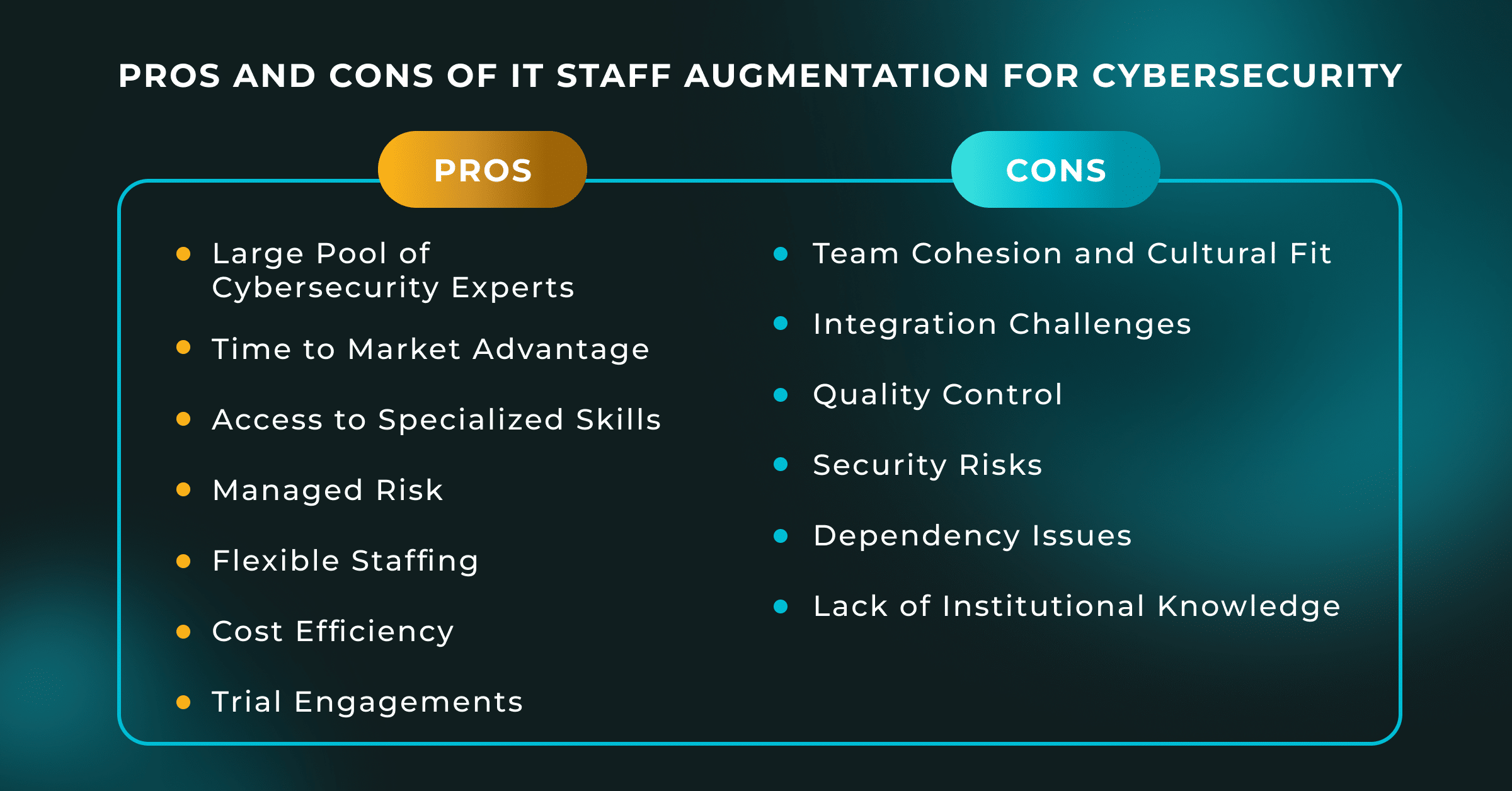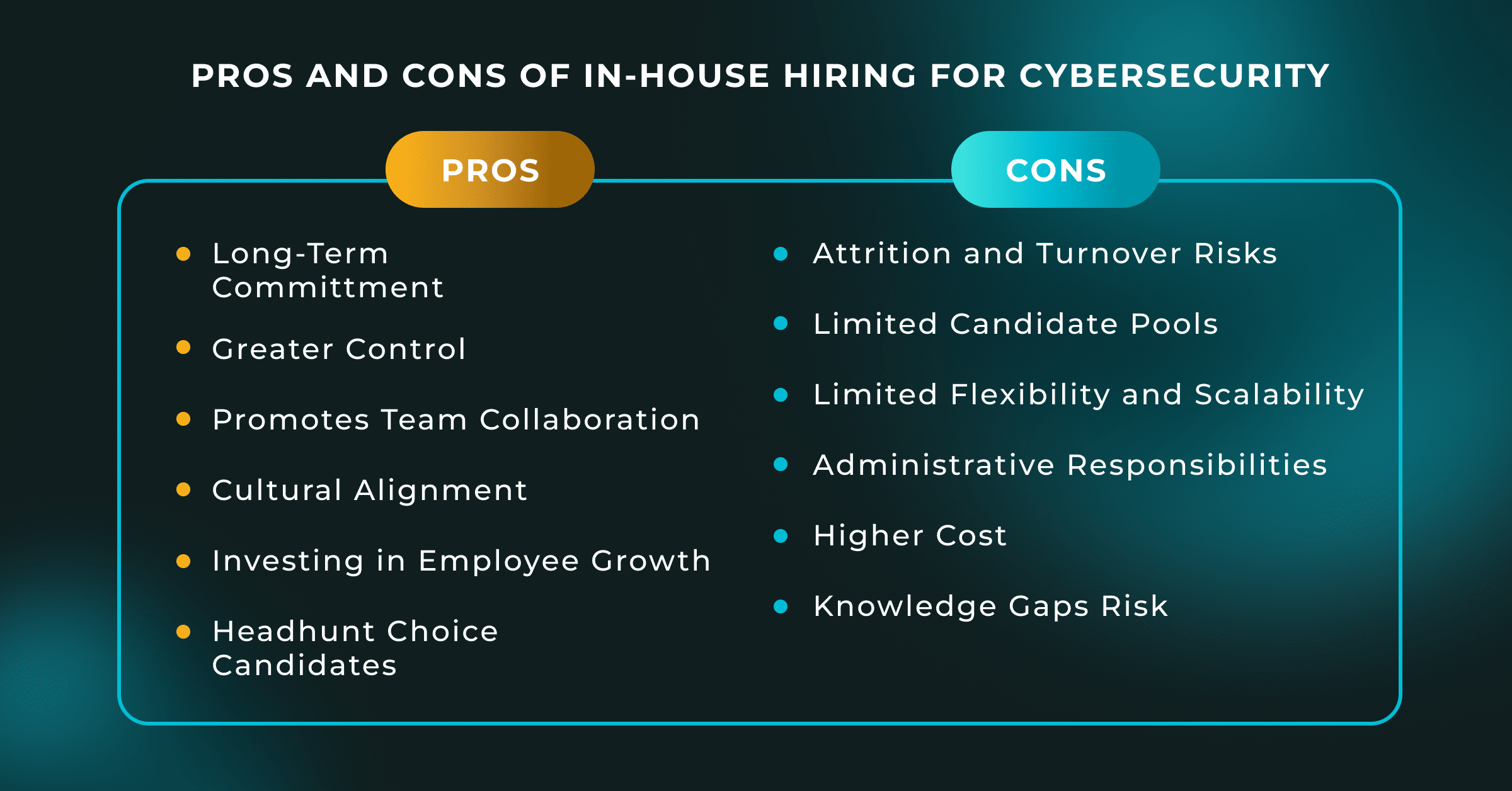IT Staff Augmentation vs. In-House Hiring for Cybersecurity: Pros and Cons
Cyberattacks are increasing in frequency and severity, with global costs projected to hit $13.82 trillion by 2028. To safeguard digital assets, organizations need to hire more cybersecurity professionals — either by augmenting their existing IT staff or recruiting new in-house employees.

If you’re not sure about which hiring approach to take, this article breaks down the advantages and disadvantages of both options. We offer insights to help you make informed decisions that meet your cybersecurity goals.
Read on!
IT Staff Augmentation for Cybersecurity: Pros and Cons
IT staff augmentation entails hiring offshore IT professionals to handle specific projects, provide specialized skills, or cover temporary staffing shortfalls.

Given the constant shortage of experts, which is a persistent trend in the cybersecurity industry, this approach allows organizations to address their security requirements without the challenges of permanent recruitment.
Pros
Let’s look at some benefits of IT staff augmentation in cybersecurity.
Access to a Large Pool of Cybersecurity Experts
Cybersecurity staff augmentation gives organizations access to a diverse pool of experts, including penetration testers, incident responders, security analysts, forensic analysts, and security architects. This approach allows companies to quickly respond to security incidents or changing security needs without the usual delays in finding qualified personnel.
Time to Market Advantage
Another advantage is the speed at which businesses can implement cybersecurity solutions by leveraging external expertise. This quick deployment is essential in the digital world, where rapid responses to security threats are essential.
Access to Specialized Skills
Access to specialized knowledge is a key benefit of cyber security staff augmentation. Companies can gain expertise in areas they might lack internally or find hard to source locally. This includes expertise in cloud computing security, AI/ML, zero trust, blockchain security, IoT security, and compliance and governance, among others. Such specialized knowledge is crucial for tackling complex cybersecurity challenges and effectively implementing advanced security measures.
Managed Risk
Engaging external cybersecurity professionals allows businesses to manage risk effectively by bringing in expertise for specific projects or durations, minimizing long-term commitments and associated risks.
Flexible Staffing
Companies also enjoy staffing flexibility when they use the augmentation model for cybersecurity talent acquisition. This approach allows them to adapt their cybersecurity resources based on varying demands or specific project needs. Such adaptability ensures that the right skills are on hand when required, optimizing resource allocation efficiently.
Cost Efficiency
This approach often proves more cost-effective than hiring full-time cybersecurity staff as it eliminates expenses associated with recruitment, training, and maintaining additional employees and overhead costs such as benefits and office space.
Trial Engagements
Businesses can also explore partnerships with external experts on a trial basis before entering into long-term commitments. This trial period allows organizations to evaluate performance and compatibility before establishing a more extensive collaboration.
Cons
Here are some potential drawbacks of this approach:
Team Cohesion and Cultural Fit
Bringing in external cybersecurity professionals can disrupt team dynamics. These new members might not fully understand or align with the company’s culture, leading to potential conflicts and lower morale among permanent staff.
Integration Challenges
Onboarding new staff and fostering unity can be time-consuming. External professionals may struggle to adapt quickly to the company’s workflows and communication styles, impacting overall efficiency.
Quality Control
Ensuring consistent performance from augmented cybersecurity staff can be difficult. With varying levels of expertise and commitment, maintaining uniform standards across cybersecurity initiatives requires continuous monitoring and assessment.
Security Risks
Granting external personnel access to sensitive information and systems introduces security risks. Without thorough vetting and monitoring, there is potential for data breaches or intellectual property theft. Adherence to security protocols is crucial.
Dependency Issues
Over-relying on external staff for critical tasks can create dependency problems. If these professionals leave unexpectedly, the organization may face challenges in quickly filling the cybersecurity talent gap, jeopardizing its security.
Lack of Institutional Knowledge
External professionals typically lack in-depth knowledge of the company’s specific systems and processes. This can hinder their effectiveness in addressing unique security challenges and developing tailored solutions.
To address these challenges, partnering with a reliable IT staffing agency like Newxel is important. We can help you leverage IT staff augmentation benefits without the risks.
In-House Hiring for Cybersecurity: Pros and Cons
In-house hiring is the traditional way to hire. It means recruiting full-time cybersecurity experts who become integral parts of the company’s workforce. However, recent data shows that only 30% of businesses have enough internal cybersecurity professionals to deal with potential threats.

Pros
Hiring in-house cybersecurity professionals offers several significant advantages:
Long-Term Committment
One key advantage of in-house hiring is that these staff tend to develop a deep sense of commitment to the company. This dedication fosters stability and consistency in cybersecurity efforts. Over time, these employees become deeply invested in the company’s success.
Greater Control
Another important benefit of in-house hiring is the ability to maintain greater control over every aspect of the team’s operation in real-time. It is a lot easier to oversee work schedules, establish priorities, and ensure compliance with company-specific regulations and procedures. This face-to-face supervision allows for better coordination and swifter implementation of security protocols.
Promotes Team Collaboration
Because everyone works in the same location, the in-house can be fully immersed in the organization’s team dynamics. This encourages improved collaboration across different departments. While the benefits of remote work cannot be denied, regular face-to-face interactions enhance communication, streamline processes, and foster a unified approach to addressing cybersecurity issues.
Cultural Alignment
Opting for internal hiring lets organizations choose candidates who align with the company’s culture and values. A strong cultural match enhances team synergy, boosts job satisfaction, and reduces turnover rates. In fact, employees who resonate with the organizational culture are more likely to make positive contributions to the overall work environment.
Investing in Employee Growth
Continuous self-improvement is one of the key features of cybersecurity professionals, and while remote experts may be able to handle their own professional growth, companies can confidently invest in training opportunities, certifications, and paths for career progression for their in-house team as they will be able to enjoy the ROI directly. Enhancing employees’ skills and knowledge boosts their effectiveness while keeping them up-to-date on evolving cybersecurity trends and risks.
Headhunt Choice Candidates
Internal recruitment provides organizations with the flexibility to handpick candidates that fit their specific criteria. This can evaluate technical competencies, experience levels, as well as personality traits to ensure they select individuals best suited for the role. This hands-on approach helps companies build a high-caliber cybersecurity team that meets their unique requirements effectively.
Cons
Here are some downsides of this approach:
Attrition and Turnover Risks
One significant challenge is the risk of cybersecurity professionals leaving for better opportunities or personal reasons. According to one source, attrition in this industry is almost 8% higher than in other sectors. This can disrupt operations and lead to a loss of critical institutional knowledge, impacting consistent security practices.
Limited Candidate Pools
Recruiting cybersecurity in-house is typically time-consuming and competitive. According to an ISC2 WorkForce Study 2023, there is a 3.99 million cybersecurity skills shortage worldwide. This implies that locating and recruiting the proper personnel will be a lengthy and difficult process.
Limited Flexibility and Scalability
In-house teams may struggle to quickly modify their size in response to project needs or developing challenges. It will be hard to respond to changing cybersecurity demands without underutilizing or overburdening the team.
Administrative Responsibilities
Managing an in-house cybersecurity team involves handling various administrative tasks—payroll, benefits, performance evaluations, compliance with labor laws, and more. These responsibilities can quickly drain resources. They can also turn focus away from core business functions.
Higher Cost
In-house cybersecurity professionals often command high salaries and benefits due to market competitiveness. Organizations may also need to invest in continuous training, tools, and support resources to maintain the team’s efficiency. All of these add up to substantial expenses—about $4700 across industries, according to the SHRM.
Knowledge Gaps Risk
In-house teams may have limited exposure to the latest threats and industry practices if they are not continually engaged in diverse projects or external collaborations. This can lead to gaps in knowledge that compromise security measures. Moreover, if key staff members depart, their specialized expertise may be difficult to replace, leaving potential vulnerabilities within the organization.
When To Choose Each Of The Options
Not sure whether to go for IT staff augmentation or hire in-house cybersecurity specialists? Here’s a guide to help you decide.
Opt for Cyber Security Staff Augmentation When
- Access to Specialized Skills. IT staff augmentation is useful when needing niche skills not available in-house, such as blockchain security, IoT security, or penetration testing. Staff augmentation provides these experts as needed.
- Cost Management. If you want to control costs by avoiding expenses associated with recruiting, training, and maintaining full-time staff. It’s a more cost-efficient solution for temporary needs.
- Urgent Deployment. This approach is ideal for quickly filling the cybersecurity skill gap for quick response to emerging threats or urgent project deadlines.
Opt for In-House Hiring When
- Ongoing Security Management. If your cybersecurity demands continuously evolve, you might consider hiring a permanent workforce. A committed internal team guarantees stability and long-term commitment.
- Control and Integration. Internal hiring gives you greater influence over day-to-day operations and makes it easier to align your staff with your business procedures and culture, should you choose to be engaged in that way.
- Value Loyalty and Commitment. Choose in-house hiring if you want permanent employees that would grow with your company. These people are more likely to develop deep institutional knowledge and align with the company’s long-term goals.
Conclusion
IT staff augmentation is a smart move for businesses navigating cybersecurity challenges. It provides flexible access to specialized skills without the long-term commitments and overhead of in-house hiring. This approach boosts agility in responding to threats and optimizes resource use.
For effective results, partner with a trusted company like Newxel.
At Newxel, we empower businesses to strengthen cybersecurity defenses through strategic IT staff augmentation. We help you find, hire, and onboard top remote experts worldwide, offering tailored solutions to tackle security projects. Whether enhancing existing teams or launching new projects, our global network of cybersecurity professionals can deliver dependable support across borders.
Ready to enhance your cybersecurity? Partner with Newxel today for cyber workforce optimization, elevating your security strategy, and driving business growth.
Let’s talk.






